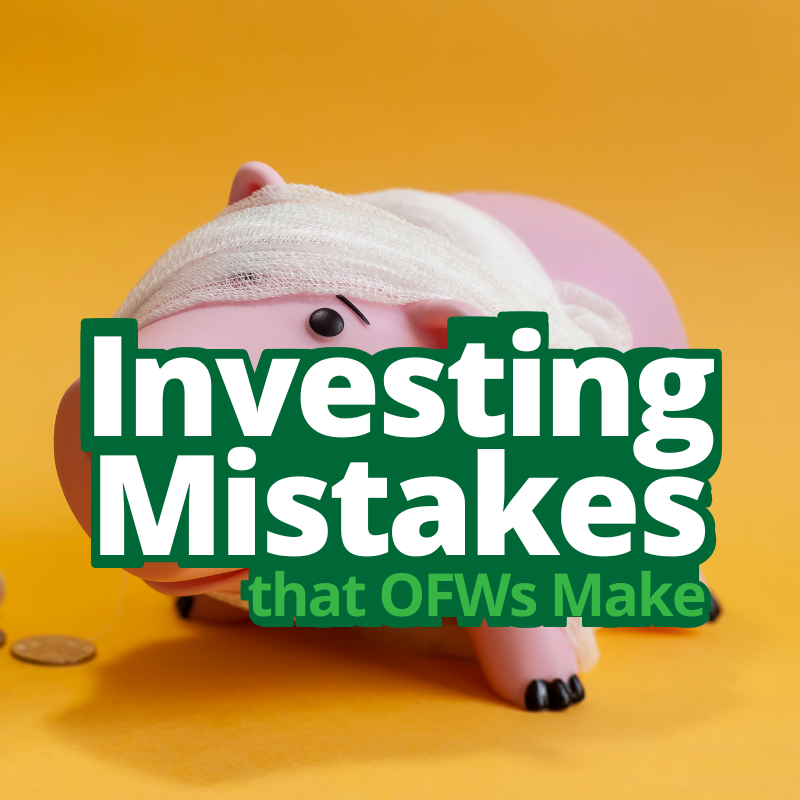No products in the cart.
OFW, Financial, OFW Finance, Working class
6 Costly Investing Mistakes OFWs Must Avoid for Financial Security
 6 Costly Investing Mistakes OFWs Must Avoid for Financial Security
6 Costly Investing Mistakes OFWs Must Avoid for Financial Security
Overseas Filipino Workers (OFWs), often called the modern-day heroes of the Philippines, make tremendous sacrifices to support their families and boost the economy through their remittances. However, despite earning higher wages abroad, many OFWs struggle with investing mistakes that prevent them from achieving financial success. Simply going overseas does not guarantee wealth, and without proper financial planning, their hard-earned income can quickly disappear.
One of the biggest challenges OFWs face is mismanaging their finances, which often leads to investing mistakes such as falling for scams, overspending, and failing to build long-term assets. Many prioritize short-term comforts for their families but neglect savings and investments that could secure their future. Without a strategic approach to wealth-building, OFWs risk returning home with little to no financial stability.
In this article, we will discuss the most common investing mistakes that OFWs should avoid. By recognizing these pitfalls and adopting smart financial strategies, they can make informed decisions that will lead to long-term financial security. Understanding these mistakes is the first step toward building lasting wealth, achieving financial independence, and making their sacrifices truly worthwhile.
Mins to Read: 12 minutes
Age: 21 – 41 years old

1. Playing the Financial Hero: Common Investing Mistakes
One of the most common investing mistakes OFWs make is prioritizing the financial needs of family and friends over their own savings and investments. It’s natural to want to support loved ones, but excessive financial assistance often prevents OFWs from building their wealth.
Many OFWs send most of their earnings back home, leaving just enough for their basic living expenses. This cycle of financial dependence makes it difficult for them to save for emergencies, invest in assets, or plan for retirement. Family members who rely heavily on OFWs for financial support often develop a sense of entitlement, discouraging them from seeking their own income sources.
How to Avoid Investing Mistakes:
•Set clear financial boundaries with family members.
• Establish a budget that prioritizes savings and investments before remittances.
•Educate family members about financial independence and encourage them to contribute to household income.
How do you avoid it?
Maintain a balance between supporting your family and saving for the future. Instead of using up all your funds and starting over, why not save money first and then spend the rest? If you form this wise financial practice, you’ll have more than enough cash for emergencies.
2. No Limitations on Family Spending
OFWs often fall into the habit of overspending on luxuries and unnecessary gifts for their families, such as expensive gadgets, balikbayan boxes filled with imported goods, or extravagant celebrations. While these gestures come from a place of love, excessive spending on non-essential items can drain financial resources quickly.
One of the biggest investing mistakes is prioritizing short-term gratification over long-term financial security. Instead of accumulating assets that appreciate in value, many OFWs spend their earnings on depreciating assets that don’t contribute to financial growth.
How to Avoid Investing Mistakes:
- Focus on building financial assets, such as real estate, businesses, or stocks.
- Limit unnecessary expenses and allocate funds toward savings and investments.
- Educate family members about responsible spending and financial discipline.
3. Falling for Investment Mistakes and Scams
Many OFWs, eager to grow their money quickly, become victims of investment scams. Fraudulent schemes promising high returns with little effort often target hardworking Filipinos who are unfamiliar with legitimate investment options. Pyramid schemes, fake investment platforms, and “too-good-to-be-true” opportunities have led many OFWs to lose millions in hard-earned savings.
Scammers often lure OFWs with promises of quick profits, urging them to recruit others in exchange for commissions. Unfortunately, by the time the scheme collapses, the victims are left with nothing but financial losses.
How to Avoid Investing Mistakes:
- Always research investment opportunities before committing funds.
- Verify the legitimacy of an investment with government agencies such as the SEC (Securities and Exchange Commission).
- Remember the golden rule: If it sounds too good to be true, it probably is.
4. Avoiding Investments Due to Fear
While some OFWs fall for investing mistakes, others avoid investing altogether due to fear of risk and lack of knowledge. Many prefer to save their money in banks, believing it to be the safest option. However, relying solely on traditional savings accounts means missing out on higher returns from investment opportunities.
Investing is essential for long-term wealth accumulation, yet many OFWs hesitate because they lack financial education or fear making the wrong decision. This investing mistake prevents them from benefiting from compounding interest, stock market growth, and real estate appreciation.
How to Avoid Investing Mistakes:
- Start with low-risk investments, such as mutual funds, government bonds, or real estate.
- Educate yourself through financial literacy programs, online courses, and investment seminars.
- Consult with licensed financial advisors before making major investment decisions.
5. Neglecting Retirement Planning
Many OFWs focus on immediate financial needs and fail to prepare for retirement. They assume they can continue working indefinitely or that family members will support them in old age. However, without a solid retirement plan, OFWs risk returning home with no savings and relying on others for financial support.
A lack of retirement savings is one of the most critical investing mistakes. Without proper planning, OFWs may struggle to cover medical expenses, daily living costs, and emergencies later in life.
How to Avoid Investing Mistakes:
- Set up a retirement fund and contribute regularly.
- Invest in retirement plans, pensions, or long-term investment vehicles.
- Consider passive income sources, such as rental properties or dividend-paying stocks.
6. Reckless Spending/”Gastador”
Many OFWs experience lifestyle inflation, increasing their spending as their income grows. Instead of saving and investing, they upgrade their lifestyle with luxury items, frequent travels, and unnecessary expenses.
This investing mistake leads to financial instability, leaving OFWs with no savings despite years of hard work. Accumulating credit card debt, loans, and other liabilities can create a financial burden that becomes difficult to escape.
How to Avoid Investing Mistakes:
- Live below your means and prioritize financial goals over material possessions.
- Avoid unnecessary debt and focus on building assets instead of liabilities.
- Track expenses and create a monthly budget to control spending.

Conclusion
OFWs work tirelessly to provide a better future for their families, but investing mistakes and poor financial habits can lead to financial instability. Many focus on immediate financial needs rather than long-term wealth building, which often results in overspending, failure to invest, or falling for scams. Without proper financial planning, hard-earned money can quickly disappear, leaving OFWs vulnerable upon returning home. To avoid these pitfalls, they must prioritize financial literacy, smart investments, and responsible money management to build a secure future.
Understanding how to avoid scams, minimize investing mistakes, and plan for retirement is crucial for long-term financial growth. Many OFWs either take excessive risks or hesitate to invest at all, missing opportunities to grow their wealth. Instead of relying on hearsay or quick-profit schemes, they should explore legitimate investment options such as real estate, mutual funds, or retirement plans. Diversifying investments and maintaining an emergency fund can help protect their financial future against uncertainties. With the right strategy, OFWs can turn their earnings into lasting wealth and financial security.
By making informed financial decisions and avoiding common investing mistakes, OFWs can achieve true financial independence. Instead of depending solely on employment income, they should work toward building passive income sources and investing in appreciating assets. Establishing a solid financial foundation will ensure stability in retirement and allow them to return home without financial worries. The sacrifices made while working abroad should translate into lasting financial security, which is only possible through responsible investing, disciplined saving, and continuous financial education.
MUST-READ AND SHARE!
2023 Your Practical Wedding Guide
Your Ultimate Access to Kuwait Directories in this COVID-19 Crisis
Investments and Finance Ultimate Guide
OFW FINANCE – Money News Update that you need to read (Table of Contents)
A Devotional for having a Grateful Heart
Stock Investment A Beginner’s Guide
How To Save Money Amidst Inflation
Philippines Best Banks with High-Yield Savings Return
Essentials Before Applying For a Credit Card
If you like this article please share and love my page DIARYNIGRACIA PAGE Questions, suggestions send me at diarynigracia @ gmail (dot) com
You may also follow my Instagram account featuring microliterature #microlit. For more of my artworks, visit DIARYNIGRACIA INSTAGRAM


 6 Costly Investing Mistakes OFWs Must Avoid for Financial Security
6 Costly Investing Mistakes OFWs Must Avoid for Financial Security
Peace and love to you.